Disclosure: Aussie Hosting is community run. We sometimes earn a commission when you buy hosting through our links. Learn more.
Wordpress.com vs Wordpress.org
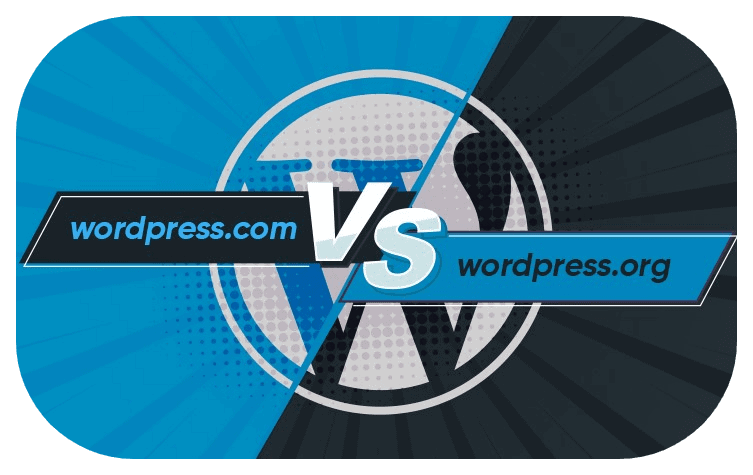 Wordpress has become one of the most ubiquitous names of our day, being essentially the myspace and geocities of modern times.
Wordpress has become one of the most ubiquitous names of our day, being essentially the myspace and geocities of modern times.
It allows you to create your own website, with minimal effort, while making your site look good and respond well across different platforms. This in turn allows you to go online and share your opinions in a personal blog
You can even make some money off affiliate marketing or eCommerce if that's your cup of tea.
Of course, there is the little snag that Wordpress.com and Wordpress.org are two completely different sites. That’s right, they each serve a different function and provide a different service.
Subtle Differences
Wordpress.com functions more as a website builder, being both quick and easy to set up, and handles everything for you.
There’s a free version with caveats, but you can chose up to 4 paid tiers with increasingly better benefits that you’ll almost certainly need if you want to monetize your site.
Wordpress.org on the other hand is just the free and open-source version of the software Wordpress.com runs. That means that you have to get your own domain name, your own hosts, and install it yourself.
You also have to deal with any issues that might arise from themes, or plugins, or who knows what.
It’s a smart system really; create an excellent open-source software, then build a business that provides all the back-end busy work so users can focus on their business.
Regardless, there are merits to both options, so don’t click away just yet. Below we’ll be looking at the different positives and negatives of each to help you decide which best fits your needs.
Wordpress.com vs. Wordpress.org
Ok, so first things first, what’s the actual difference between these two sites?
Wordpress.org allows you to build and host your own wordpress blog. Essentially it’s a blogging tool that allows you to create your own wordpress site from scratch and then host it yourself on some great wordpress hosting providers.
It gives you a ton more control over how your site looks and reacts when people go on it.
Wordpress.com on the other hand is both a website builder and wordpress host. Essentially, it takes all the tools that you find on wordpress.org and provides you different hosting plans, as well as additional tools like google analytics and SEO tools.
Wordpress.com is much easier to setup and get started because it handles a lot of the front and back-end for you, but that takes your own control away.
So, which should you go for? That depends a lot on the below factors, such as your budget, your experience and the time commitment you can put into it.
Of course, there are also other quality website builders you can go for, but wordpress.com is considered one of the top.
Wordpress.com vs Wordpress.org: Price Comparison
 Ok, so first things first, how much does each cost you? Well, starting with Wordpress.com, there’s a free option you can pick from with certain caveats.
Ok, so first things first, how much does each cost you? Well, starting with Wordpress.com, there’s a free option you can pick from with certain caveats.
For one, it has to be a wordpress Subdomain (yoursite.wordpress.com) and you also get Wordpress’s ads on your pages, which isn’t great.
You also only get 3GB of space on their hard drives which is actually a surprisingly good amount, especially if you’re just going for a personal blog.
Of course, you can go for one of their paid options but those start being expensive.
Wordpress.com Pricing
Wordpress personal is 4$/month billed yearly, so $48 a year, and it starts you out with your own domain URL and the removal of ads. You also get a free domain for free for a year, plus some basica support from Wordpress.
More importantly you get several new themes, a payment system, a subscriber system, a paid newsletter and 6gbs of space.
Moving on to Wordpress Premium which costs $96 per year at $8 per month, you get all the features from personal 13GB of storage space, premium themes and advanced customization through CSS.
Even better is that you get WordAds, Google Analytics Integration and Video press support. This tier is great if you want to get started on monetizing your site, since it gives you the base tools to do so.
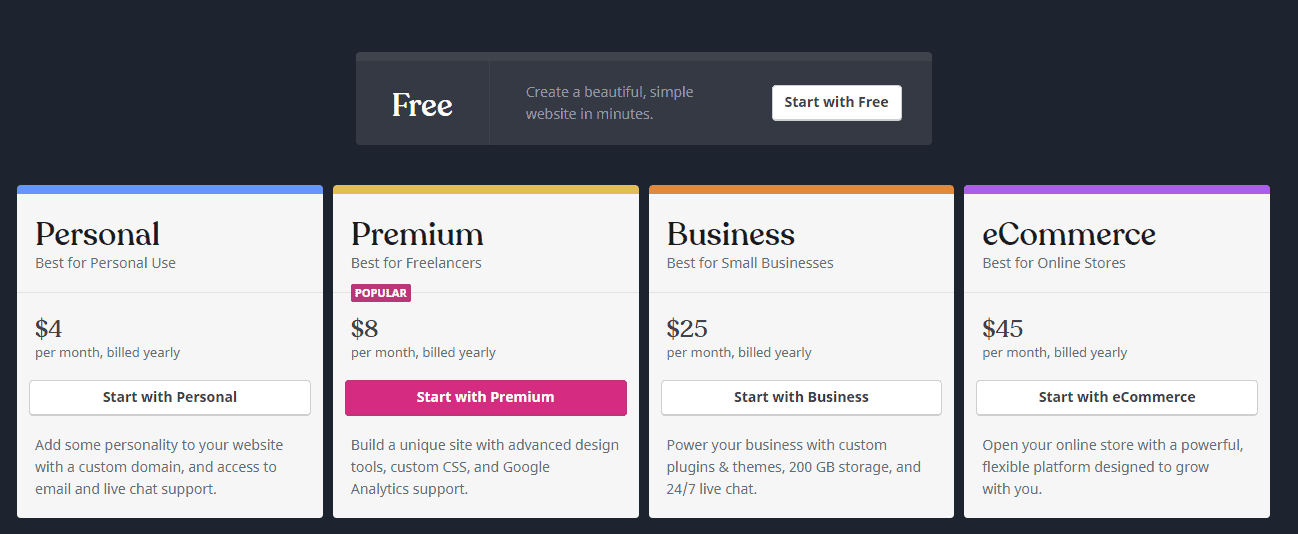 The next is Wordpress Business and the price increases rapidly to $300 a year at $25 a month, but you do get a lot in return, such as a whopping 200Gb storage and SEO tools, the latter of which is incredibly important.
The next is Wordpress Business and the price increases rapidly to $300 a year at $25 a month, but you do get a lot in return, such as a whopping 200Gb storage and SEO tools, the latter of which is incredibly important.
There’s also some great behind the scene things you get such as Automated backups, custom plugins, and SFTP (that’s a secure file transfer protocol, very useful for moving things to and from your storage).
The heist tier is Wordpress eCommerce, and as the name suggests, it's made for people who want to take their website monetization to the next level. It costs a whopping $540 a year at $45 a month and it adds a bunch of eCommerce options.
Payments from 60+ countries, eCommerce marketing tools, and even premium starter themes that you can completely customize. I’m not sure I’d pick this tier as a start, but it's certainly doable with what you get.
Wordpress.org Pricing
On the flip side, Wordpress.org is essentially completely free. That is to say, that you can download the software for free, but there are additional costs.
For starters, you’re going to need a domain name which you can get from a domain registrar. Prices can vary widely depending on the domain name itself in terms of how common the wording is, as well as what top-level domain you pick. A .com domain is going to cost much more than a .space domain for example.
Prices can generally start as cheap as $3 a month and go upwards, and you can usually get better pricing if you pay by the year or get multiple-year packages. Ultimately this will depend on the kind of budget you have and how comfortable you feel with the specific domain registrar you chose.
The next step is finding a host, and in this case we suggest Bluehost, as it’s the host Wordpress.org itself recommends. There’s a ton of different plans, with the cheapest being $3.95/month shared web hosting which even gives you a free domain for a year.
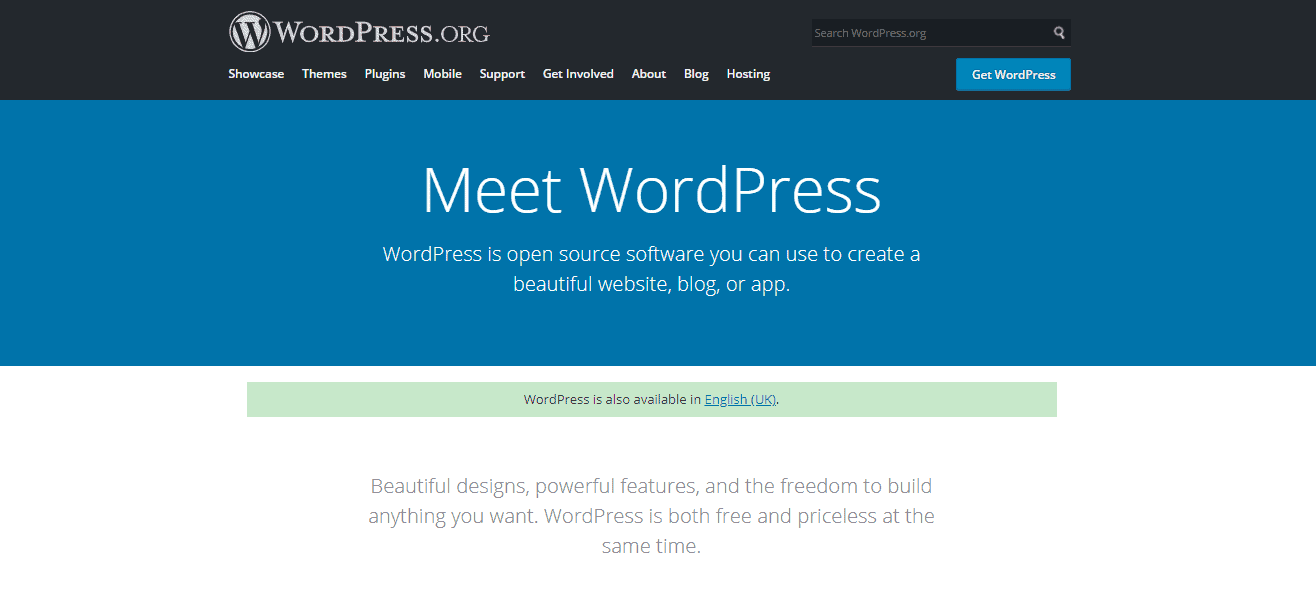 If you want more control, which you probably do if you’re going with wordpress.org, then going for their VPS or dedicated offerings is probably a better idea.
If you want more control, which you probably do if you’re going with wordpress.org, then going for their VPS or dedicated offerings is probably a better idea.
They’re more expensive, starting at $19.99 a month for the VPS and a whopping $79.99 for dedicated, but it’s absolutely worth it if you want to have full control. We’d probably suggest going for the VPS first though until your site has started making enough to warrant the more expensive package.
The final big question in terms of cost is whether you’re going to be creating the site on your own, or hiring a wordpress developer to do it for you. Truth is, developers can get expensive, anywhere from $50/hour going up, so it might end up costing you more than just going with wordpress.com.
Of course, in return you get a professionally made website, but ultimately this comes back to you. Definitely try it out on your own first if you can.
Which Has The Better Pricing?
This is a harder one to answer because there’s really two answers:
If you have some experience with website development or admin, and have a ready server, Wordpress.org is hands down the best option, because it’s free.
If you *don’t* have that experience and don’t have a server, then Wordpress.com is better since its free, and even the first few levels of their paid plans are relatively cheap.
Wordpress.com vs Wordpress.org: Setup
Speaking of creating your wordpress site, we should certainly look at the difficulties involved with each option.
Wordpress.com Setup
As you can imagine from a site that is marketed as a website builder, creating your website on wordpress is incredibly simple and doesn’t really require any know-how.
In fact, there is even a big button on their landing page that says ‘start your website’ which takes you through a quick account creation process.
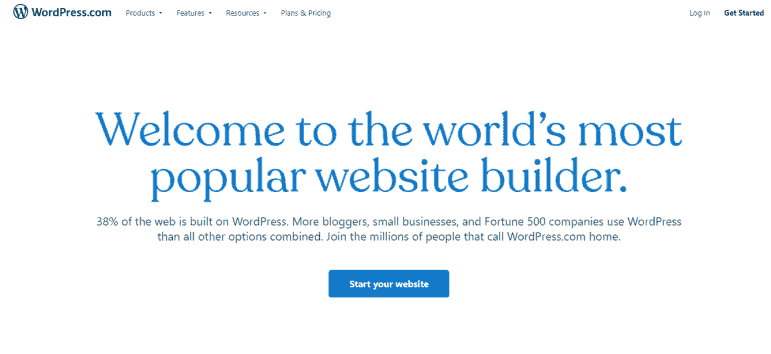
After that, you’re presented with a few simple choices which are straightforward, mostly what kind of theme or design you want and that’s basically it.
Of course, you can expand on that as well. For example, the higher the subscription tier you get, the more themes and plugins you can choose from (more on that in a bit).
Another example is the use of CSS, which allows you to customize the look and feel of your site more. Neither of these things are needed, especially the skill to code, but it’s a nice additional thing to have.
Wordpress.org Setup
As mentioned in the previous section, Wordpress.org is slightly more complicated and will require some time to get going. There’s generally two different ways to go about setting up a site through wordpress.org
The first, and simple way, is to go through a good wordpress host, we mentioned Bluehost but Siteground and Hostpapa are two other good ones. Usually through one of these services you can install Wordpress.org, which is available through a one-click installer.
All you really need to do is go in, set up an account, choose a plan and pay, and you’ll have access to the installer.
After that, you can do any customizations that you feel like doing.
The other route is slightly more complicated and requires you to pick a host first, preferably either a VPS host or dedicated host. Once you’ve picked a plan and set everything up, these are the general steps:
- ☑️ Go to Wordpress.org and download Wordpress
- ☑️ Unpack it in a folder
- ☑️ Create a Wordpress database on your Webserver
- ☑️ Create a MYSQL user with all the permissions
- ☑️ Upload the Wordpress files to your server
- ☑️ Run the Wordpress install script through the URL in the web browser.
This is a quick and dirty guide and mostly there to give you an idea of the steps required. If you want a bit of a more in-depth guide, Wordpress themselves have created a guide on how to install Wordpress.
If you have a little bit of coding and tech know-how, it’s not overly difficult, and their detailed instructions are easy to follow.
Which is Better in Terms of Setup?
Wordpress.com is hands down much easier to deal with when it comes to setup, since the website pretty much handles everything for you. If you don’t have much experience picking hosts and dealing with their installers, then Wordpress.com is the safe choice.
Wordpress.com vs Wordpress.org: Themes
Themes are really central to the Wordpress experience, as they provide you a quick way to create the interface for your website.
Wordpress.com Themes
Right out of the box, Wordpress does actually provide you with a number of free themes if you go with their free plan. There’s 91 different ones you can pick from, and they’re all pretty good and responsive on all platforms.
You can also chose to buy themes if you’d like to do that, although there’s a limit on the selection, about 150. This limit also applies to the paid personal plan, although you do get a larger selection of free ones to pick from.
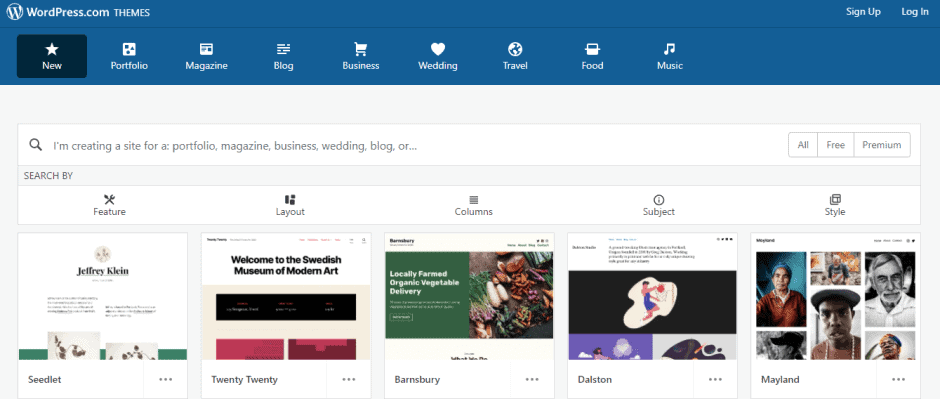
If you end up going with the more expensive plans, you get a access to *all* the free themes, as well as 200 more premium themes. Sadly, you’ll also need these more expensive plans if you want to make anything more than basic CSS edits to your theme.
This isn’t necessarily a deal breaker though, especially if you don’t really need that customization or if you already like the free themes.
Not only that, but the cheapest plan that gives you access to everything is premium, and at $96 per year at $8 per month, it’s not actually that bad of a price.
In exchange you get all several hundred free themes, another few hundred premium themes you can buy, and of course advanced CSS edits.
Wordpress.org Themes
So, if you go for Wordpress.org, you get access to literally everything for free as the whole thing is open-source. We’re talking literally thousands of themes, 7,500+ from the Wordpress official directory alone. You could sit weeks sifting through themes to find the exact perfect one for you.
Not only that, but you can even install themes from other places on the internet, with thousands of those as well, including both free and premium. Some sites you can checkout for that include Studiopress, Themify, and Themeforest.
Even better is that with Wordpress.org you have complete control and access over your CSS, so you don’t need to pay anything to get more advanced features.
Which One is Better for Themes?
Again, Wordpress.org would have to be the winner here. Not only because of the massive selection you get for free on their own directory, but because you can also add themes from external vendors as well. Wordpress.com could never compete on the theme front.
Wordpress.com vs Wordpress.org: Plugins
 So what are plugins exactly? Well, essentially they are like apps that extend the functionality of your website.
So what are plugins exactly? Well, essentially they are like apps that extend the functionality of your website.
This can be anything from different types of blocked texts (such as a wiki) to back-end plugins such eCommerce or marketing tools.
Wordpress.com Plugins
Sadly, you can’t actually install any additional plugins beyond the basic ones you get on the majority of plans. To get access to the plugin directory that Wordpress has available, you need to be either on the Business plan or the eCommerce plan.
With one being $25/month and the other being $45/month that’s a pretty steep price to pay. On the upside, you do get access to 50,000+ plugins.
Wordpress.org Plugins
Much like the themes, if you go with Wordpress.org you get completely free access to the above 50,000+ plugins. That’s right, they use the exact same directory, so if you see a plugin you like on one site, you can use it in the other.
On top of that, you can also add plugins from outside the directory as well.
Be warned though that the quality of plugins vary wildly, and some plugins can be free and others could cost several hundred dollars a year.
Which One is Better for Plugins?
Well, at the end of the day they are essentially the same, since they use the same plugin directory.
One could argue that since Wordpress.org provides them for free (with the caveat that you need to pay for hosting and what not) and that you can install external plugins without any problems, Wordpress.org is better.
We’re not sure that’s a great argument though, especially since the plugins that you get with the free tiers of Wordpress.com are all you need for blogging.
Wordpress.com vs Wordpress.org: Monetization
For most people, going the monetization route for their website is pretty normal, and the reason why they create a website in the first place.
Even for those who are creating personal blogs, some form of monetization helps provide them with a little bit of extra income that go back into the blog. This can either be in the form of cost of time spent or even a giveaway of some sort.
Wordpress.com Monetization
 When it comes to Wordpress.com you’re essentially working on an uphill battle.
When it comes to Wordpress.com you’re essentially working on an uphill battle.
The main reason for this is that with the free plan, Wordpress spatters their own ads throughout your blog.
This can make it difficult if you want to include your own ads, especially since they specifically don’t allow you to through something like AdSense.
If you move up to the personal plan, the Wordpress ads do get removed, thankfully, although you’re still left with an inability to integrate some form of ad tool.
If you want that, then you’re going to have to go for either the Premium plan or one of the more expensive ones. If you do, you get access to WordAds, which is Wordpress’s equivalent to Adsense, and it’s not too bad.
Of course, ads aren’t really the only way to make money through a Wordpress site, which is why the eCommerce tier exists. It’s certainly on the expensive side at $540 a year at $45 a month, but it gets you a lot of important tools you'll need for eCommerce.
Especially useful in this case is the ability to accept payments from 60+ countries as well eCommerce marketing tools.
Interestingly, Wordpress’s eCommerce solution works well compared to something like shopify. The main difference here being that Shopify is designed more as a storefront whereas Wordpress can absolutely work as a blog or site. This is something you should absolutely consider.
Wordpress.org Monetization
If you’ve been following the article so far, you’ll know that Wordpress.org is open-source, and therefore you can pretty much do whatever you want with it in terms of monetization.
For example, you can absolutely install plugins like Ecwid and Woocommerce, without really having to pay a dime. Well, aside for any setup and any royalties these sites take. Either way, Wordpress.org doesn’t make you pay for monetizing your website.
Which one is Better for Monetization?
Well, since Wordpress.org allows you to do whatever you want, then it wins hands down in this situation. Of course, there are some alternatives if you’re interested in eCommerce hosting, and Wordpress is not the end all be all.
That being said, there is a form of monetization we haven’t talked about, and that’s affiliate marketing. You don’t actually need any eCommerce tools for that, or an eCommerce site or Wordpress plan.
In fact, just getting the ads removed by going with the personal plan can be enough to make you legitimate to companies that have affiliate marketing programs.
Not only that, but there are other things besides affiliate marketing. You could set up a patreon for one-time payments or subscription model, you can ask for donations, you can create a membership area.
There’s absolutely tons of options beyond selling ads or eCommerce. As such, both sites are about equal when it comes to that, so don’t worry too much on that front.
Wordpress.com vs Wordpress.org: Maintenance & Security
 Alright great, so now you have your website, its set up, you have your plugins and themes, and you’ve even figured out your monetization scheme, what next?
Alright great, so now you have your website, its set up, you have your plugins and themes, and you’ve even figured out your monetization scheme, what next?
Well, now you have to think long-term about how you’re going to keep your website going in terms of the back-end, and this can be a doozy.
The main Wordpress company generally has minor updates every two weeks and a major update every 2 months, so how does that apply to you?
How Secure Is WP .com?
The great thing about Wordpress.com is that it’s a host, and also the main company that does the updates, which means that everything is handled for you automatically.
You don’t need to worry about doing any sort of updates or putting your site out of commission for a while because of a mistake. Not only that, but you don’t have to keep up with when the updates come out so that you can apply them as soon as possible.
Similarly, since Wordpress.com handles everything, you won’t need to worry about compatibility issues with your plugins or themes.
If you’ve ever had to deal with 3rd-party software that plugs into a 1st-party program, you know the nightmare it can be every time that 1st-party program has a major update.
Granted, you don’t have the access to as many themes and plugins, but at least you’ll know that they’ll always be working when they need to be.
Bonus Features
Another thing to consider is the Secure Sockets Layer (SSL) certificate which you will always need. This helps secure your site, provide you with an HTTPs url, and rank you higher with SEO since most search engines care about that now.
With Wordpress.com, all of that is handled for you and you don’t have to worry about getting it or maintaining it, which is great.
Finally there’s backups. You never know what could happen to your site, there’s always a one in a million chance that an update causes a massive issue, or the main storage that the site is on goes down.
This is why backups are important and Wordpress.com handles all of that for you, so there’s lots of convenience.
Wordpress.org Security Reviewed

On the flip side there’s Wordpress.org, where you’ll possibly have to do all the above mentioned stuff on your own. There is a bright spot here so don’t scroll past just yet.
For starters, if you go through a good Wordpress host such as Bluehost, most of the updates will be handled for you.
They might not all do it automatically, and might need a prompt to be activated first, but for the most part it’s somewhat hassle free. You just need to be on top of the updates and make sure everything is installed on time and correctly.
A similar thing applies when it comes to SSL certificates. Most good hosts will throw one in as part of the hosting plan, so you won’t have to worry about handling it on your own.
This is great if you don’t have much tech experience and don’t feel like diving into the world of SSL certification. Always check that the host provides one of these certificates if you want them to handle it.
Finally, backups can sometimes be handled by your host as well, depending on which host you go for and what plan you’ve subscribed to. Nonetheless, you should always backup your site yourself, just to be extra safe.
Which One is Better for Maintenance & Security
Well, considering that Wordpress.com essentially does everything for you, then we’ll have to say that Wordpress.com wins this category.
That being said, if you end up going with a good host that also covers everything, it can certainly level the playing field, but it is an extra step that you need to take when setting up, so it’s not as hassle-free.
Ultimately, you need to decide if you care more about a quick and easy process but with restrictions, or a slightly longer and slightly more difficult process with lots of freedom.
Wordpress.com vs Wordpress.org: Support
 Probably one of the most important things to think about is how you’re gonna get help when things inevitably don’t go to plan.
Probably one of the most important things to think about is how you’re gonna get help when things inevitably don’t go to plan.
This can be either because a plugin isn’t working like it should, or a theme is acting weird, or maybe even something as simple as logging in.
Having a reliable customer support system is very useful when you’re trying to run a site you rely on financially.
Wordpress.com Support
Sadly, the free version of wordpress.com doesn’t have any support, but the moment you go on any paid plan. The lowest plan, Personal, gets you email and basic live chat support, which as you may know, is not perfect, but not bad for what you pay.
At the Business level, two tiers up, you get 24/7 priority live chat, and at the eCommerce level, you can schedule your own one-to-one session with a wordpress.com expert.
So basically, you get what you pay for when it comes to Wordpress.com
Wordpress.org Support
Right off the bat we’ll tell you that there is zero support from Wordpress when it comes to Wordpress.org.
It’s not all bad though, luckily if you go with a wordpress host that’s good, they’ll have their own support system that you can fall back on. It’s not perfect of course, but it's better than nothing.
Just be aware that when it comes to 3rd party themes and plugins, you’ll have to rely on their support system, if they have one.
Which One is Better for Support?
Well, considering that Wordpress.org doesn’t have any form of official customer support, Wordpress.com wins this category hands down.
Wordpress.com to Wordpress.org migration
Ok, so what if after reading all of this you want to use Wordpress.or but you already have a Wordpress.com site? Well, the good news is that you can migrate it, and if you’ve been following closely so far, then you have a good idea of the tools that you need.
#1 Domain Name
First things first, unless you already have a domain name ready through one of your Wordpress.com plans, you’ll need to get one. There are some good domain registrars out there, so make sure to check them out and see who will provide you with the best price.
#2 A Host
You’ll need to put your Wordpress.org website somewhere, and a host can provide you with the place to do it. There are some cheap hosts and free hosts, but we suggest you go directly with a Wordpress host.
 As you’ve probably read above, going with a host who is familiar and caters to Wordpress means that you’ll probably get the domain, along with an SSL, storage, support and a one-click installer.
As you’ve probably read above, going with a host who is familiar and caters to Wordpress means that you’ll probably get the domain, along with an SSL, storage, support and a one-click installer.
#3 A Clean Install of Wordpress.org
Speaking of one-click installers, the very next thing you’ll need is a completely fresh installation of wordpress.org where you are hosting it. Depending on the host you have, this should hopefully be a relatively easy process, just follow what they ask you to do.
#4 Migrating Content from your Wordpress.com site
This is where the actual fun begins and the heaviest lifting part of the process.
On Wordpress.com
- ☑️ First, you’ll want to log in and go to the My Site tab and click on WP Admin
- ☑️ From there, click on Tools, and then Export. Once on this page, you’ll get two choices;
- ☑️ A guided transfer or an export. The guided transfer is expensive at $129 but it will be the easiest option.
- ☑️ Assuming you’ll just take the free option click on ‘Start Export’
- ☑️ This will take you to the next page where you pick what content you want to export. Make sure that ‘All content’ is selected. After that, click ‘Download Export File’.
On Wordpress.org
Next thing you need to do is install an import plugin on your Wordpress.org site.
- ☑️ Log in to your Wordpress.org site
- ☑️ Follow the same steps above and go to ‘Tools’ then ‘Import’.
- ☑️ The last option should say ‘Wordpress’ click the install link
#5 Importing Your Content
The next part is relatively simple. Once the importer has been installed, click on ‘Run Importer’ on the same page, and direct it to the XML file that you downloaded. After that, just click ‘Upload File’ and you’re basically done!
The next page will basically ask you about creating a new users (which you’ll need to make if you have several writers), as well as if you want to transfer over the older username and password.
You’ll also want to make sure you check the box that says ‘Download and import file attachments’. This will make sure all the images and what not are imported from your old site.
In Conclusion
There you have it! Wordpress as an ecosystem is important, which is why it runs a third of the sites on the internet, weather through getting Wordpress.com or Wordpress.org.
Hopefully we’ve managed to give you some good insight and some great tips when it comes to choosing which one you should go for. Good luck!

